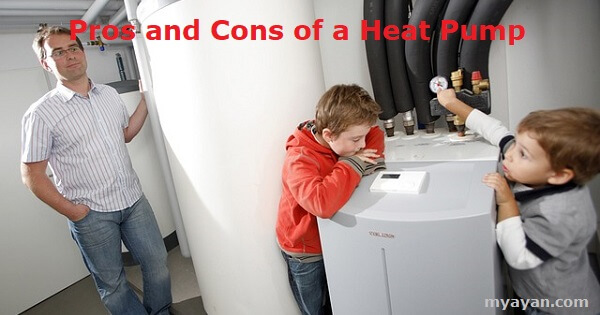Educating yourself on the Pros and Cons of Heat Pumps before deciding to purchase a heat pump system is crucial. Heat pumps are a fantastic investment for homeowners because of their many benefits. Yet several things need to be considered.
To assist you in making an informed choice and prudent investment in this low-carbon heating technology, we will examine these benefits and drawbacks in more detail below.
Heat pumps can be a terrific option for your home in several ways. We list some benefits of installing a heat pump below.
Compared to systems based on combustion, heat pumps are less expensive to run. Long-term energy savings increase as system energy efficiency increases. Even though the cost of a ground source heat pump can reach up to £45,000, this eco-friendly purchase can help you save up to £1,400 annually.
Compared to heating systems that use combustion, heat pumps require less maintenance. Once a year, the heat pump will need to have some components checked, but you may perform this on your own. The heat pump will only need to be inspected by a qualified installer every three to five years.
I think heat pumps are safer to use than combustion-based heating systems. They can avoid burning fuel to provide heat since they depend on electricity.
It decreases carbon emissions through a heat pump system, effectively converting energy to heat. For instance, exceptional efficiency values of about 600% are possible with water-source heat pumps.
Heat pumps can go from a heater to an air conditioner when the temperature rises. Air-to-air heat pumps can quickly select a cooling mode throughout the summer.
A heat pump has an average lifespan of around 15 years; some can perform well for up to 20 years. They provide a consistent and incredibly reliable source of heat.
To encourage householders in England and Wales to install low-carbon heating technologies, such as heat pumps and biomass boilers, the UK government established the Boiler Upgrade Programme (BUS). The program will last for three years, with the application period starting in the spring of 2022.If you match the requirements, you may be eligible to receive up to £5,000 for an air-source heat pump or £6,000 for a ground-source heat pump to assist with the upfront costs.
One of the most effective options for home heating is a heat pump. Yet, certain disadvantages exist before making a heat pump purchase.
Although heat pumps have a high initial investment, their low running costs result in long-term energy bill savings and lower carbon emissions.
Installing a heat pump can be challenging since it requires careful planning and research to understand the movement of heat, the local geology (particularly for ground source heat pumps), and your household's heating and cooling demands.
Some fluids used for heat transfer are not entirely sustainable, raising environmental issues. Using biodegradable fluids is advised.
A heat pump installation requires considerable labour and inconvenience to your home and garden. An appropriate illustration would be the requirement to make penetrations through building cladding.
In cold weather, air source heat pumps may face problems, including icing, which could ultimately cause a system failure. Even though automated defrosting is a common feature of modern heat pumps.
They will also operate less efficiently and consume more electricity in extremely low temperatures. Ground-source heat pumps are significantly more resilient to freezing temperatures.Always check your heat pump's Seasonal Performance Factor (SPF) .
Conclusion
The ideal heat pump for your house truly depends on various variables, including:
Installing a heat pump is a significant decision influenced by many different aspects.
You need to consider more than just the installation and expenditures; you should also consider the commercial benefits to your property, how long you might stay there, and any potential changes in your lifestyle that could affect your finances or capacity to get one today.
Consider many aspects, such as your budget, home size, and space's thermal efficiency. It's crucial to have a certified contractor explain the setup and maintenance costs specific to your scenario. Of course, every home is unique, so before you decide, we advise you to seek expert guidance from an allowed installer.

In cold weather, air source heat pumps may face problems, including icing, which could ultimately cause a system failure, even though automated defrosting is a common feature of modern heat pumps. They will also operate less efficiently and consume more electricity in extremely low temperatures.
Most of the time, heat pumps are worthwhile. Heat pumps are often more expensive to install, but because of their low maintenance requirements, you save more money over the year. Heat pumps are far safer because there is no chance of a gas leak, which could expose you to carbon monoxide.
About 10–15 years. Heat pumps rarely last as long as furnaces and air conditioners because we use them year-round. They have a 10- to 15-year lifespan on average.
Yes, heat pumps require maintenance twice a year.Each system only manages one comfort-related task, and they typically only operate for a specific year's season. A heating system needs maintenance in the fall to get it ready for winter, and an air conditioner needs it in the spring to prepare it for summer.